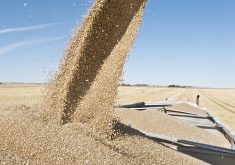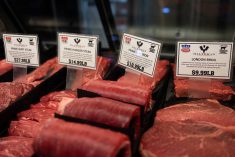Canadian canola industry players have swarmed Ottawa this week, trying to make decision makers see how important the crop is.
They want the government to fight hard for canola in the international arena.
“We’re going to tell them we’re a great Canadian success story and in order to stay that way we need their help,” said Canola Council of Canada president Barb Isman.
“We think the world’s only made-in-Canada crop is worth promoting in Ottawa as much as it is worth consuming in the rest of the world.”
Read Also

Soybean market still figuring out implications of China-U.S. pact
Soybean futures had a muted reaction to the U.S. trade deal with China as the market tries to figure out the nuances of the deal.
Isman said the canola industry wants to ensure the federal government doesn’t do anything to harm the crop in Canada. As a result, it fights aggressively to see canola treated fairly in world markets.
Canola now faces the threat of extra costs in Canada if the government forces food with genetically modified products to be labelled as such. And it faces relatively high tariffs in some foreign markets.
“We don’t want any rules in Canada that would discourage investment in canola,” said Isman.
Continued investment in canola varieties is important because the crop needs to keep its edge as a healthy product. Canola oil is promoted in the United States as a healthier alternative to other vegetable oils, but soybean developers are trying to create healthier varieties of that oil so they don’t lose the market.
Isman said modified soybean oil and canola oil can both serve health conscious consumers, but canola needs to keep its reputation as the healthiest oil.
“High oleic canola and low-lin soybeans meet in the same marketplace,” said Isman. “We think there’s opportunities for both, but we need to make absolutely certain that we have a domestic and international regulatory environment that doesn’t put canola at a disadvantage to soybeans.”
Next week the industry will also brainstorm about its promotional drives in the U.S. and overseas.
In the past year the crop has been pushed in the United States and marketers have been developing interest among non-traditional customers, said Dave Hickling of the Canola Council.
“The demand for canola is increasing around the world,” he said.
There still is no new dependable market for Canadian canola, but the number of occasional buyers is increasing.
China is always interested if canola is cheap enough, as is Pakistan. Indian oilseed buyers are also becoming interested.
That’s good, Hickling said, because the industry wants to be able to move beyond total reliance on the U.S., Mexico and Japan.
“We’ve said for years that we need at least a couple or three (more) significant customers,” said Hickling.
A problem is that many importers have to pay higher tariffs to import canola than they do to import soybeans.
“We’re trying to right that,” said Hickling, who recently visited China and Pakistan.
Canola also suffers in China because canola meal is mixed with rapeseed meal. Since only small quantities of rapeseed meal can be fed to livestock, canola’s meal content is heavily discounted in the Chinese market, making the crop much less attractive.
The council is trying to work with Chinese crushers to segregate canola meal from rapeseed meal, something Hickling estimates could add $30-$40 US per tonne to the value of canola seed.
“We’re trying to create a higher value for canola meal in China so that they will be able to pay a higher price,” said Hickling.















